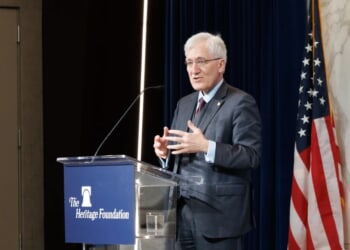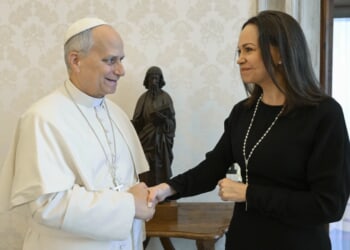One child interrupts, “Um, Dad, I spilled that really big cup of milk.” Another child needs extensive help with math homework. My wife gets the flu and is out of commission for several days. Other times, she has a different plan for how to spend a day off. My boss at work informs me of an unexpected, mandatory meeting, or interrupts one project for another he deems more important. These, and countless other scenarios, interrupt my plans and expectations—and it’s not just me this happens to—everyone experiences it.
How do I approach these situations that feel like emotional grenades in my lap? How do I manage the annoyance and frustration that may enter my mind and heart? As I try to navigate this psychological, emotional, and spiritual conundrum, I know I need to look to Jesus, the One who speaks words of perfect truth and acts out of perfect charity. I need to learn from His responses.
As I look for Jesus’ words and example, the Gospel of St. Mark stands out in stark relief. Recorded there, I find quite a few moments when Jesus was doing one thing, or was on His way to some place with a specific objective in mind, when He was interrupted—by an unexpected visitor, a new request, or even a storm in the middle of His nap. Jesus always approached these moments with patience and peace. Can I imitate Him instead of reacting in an unhealthy or uncharitable way?
Several moments and episodes fit the pattern. Jesus was “at home,” “preaching the word” in Capernaum, when four men tore a hole in the roof to lower down their paralyzed friend. Many of us would be worried immediately about the mess or the hassle of fixing the hole. Jesus, though, “saw their faith,” healed the man, and then discussed forgiveness with the Pharisees (Mk. 2:1-11).
On another occasion, “his mother and his brothers came, and standing outside they sent to him and called him” while He was teaching a different group (Mk. 3:31-34). And at least a couple times, Jesus was interrupted as He “reclined at table,” meaning He was interrupted during a meal (Mk. 2:15; 14:3). Then there was the storm on the Sea of Galilee, the closest Jesus came to exhibiting any kind of annoyance. They woke Him from His slumber, asking, “Teacher, do you not care that we are perishing?” I have been interrupted by kids at least a few times while I was teaching. Meals and sleep have been cut short more times than I can count. I rarely respond like Jesus.
In another scene, “a great crowd gathered about him,” which might cause enough stress—especially for the introverts among us. Then, Jairus announced his daughter’s dire condition and requested her healing. Jesus started in that direction but was interrupted on the way by the woman hemorrhaging blood. He healed the woman and continued His mission to Jairus’ daughter. When He arrived, members of Jairus’ household were flustered with anxiety, announcing that the daughter had already died. In a perfectly peaceful way, Jesus asked, “Why are you making a commotion and weeping?” Despite their ridicule of Him—which would frustrate any of us mere mortals—Jesus brought the little girl back to life because Jairus had acted in faith (Mk. 5:21ff).
In the very next chapter, when Jesus and the apostles were seeking respite, a great throng found and encircled them, yearning for wisdom and miracles. Because “they were like sheep without a shepherd,” Jesus took time to minister to them by multiplying loaves of bread and fish to feed a crowd of roughly ten thousand (Mk. 6:31-44).
Two short sentences after this episode reveal the reason Jesus could accept these interruptions and these persons with patience and a peaceful demeanor. “And after he had taken leave of them, he went up on the mountain to pray” (Mk. 6:46). The only way He could face constant taxes on His time and energy was to spend the time in between communing with the Heavenly Father.
What does this mean for me practically? It means that I must seek communion with the Heavenly Father. It means waking up before the rest of my family to ensure quiet prayer time; ensuring I do not miss my weekly Holy Hour in Eucharistic Adoration; choosing to delay watching my favorite show or the fourth quarter of the football game to pray my daily examen instead.
I frequently fail to hit the mark but, still, I know the important truth. Communion with the Heavenly Father through silence is the only way I can receive the grace, the perspective, and the inspiration to imitate Jesus when I am presented with each day’s problems, frustrations, and annoyances. Silence provides the time and space for God to cultivate humility, diligence, and charity in me. Those are the “mundane” virtues that eventually result in a great life, and in holiness.
Yet, like Jesus, we will not be able to remain perpetually in silence. We will be interrupted even there. At these points, the instruction of St. Vincent de Paul is valuable:
If a needy person requires medicine or other help during prayer time, do whatever has to be done with peace of mind. Offer the deed to God as your prayer. Do not become upset or feel guilty because you interrupted your prayer to serve the poor. God is not neglected if you leave him for such service. One of God’s works is merely interrupted so that another can be carried out. So when you leave prayer to serve some poor person, remember that this very service is performed for God. Charity is certainly greater than any rule. Moreover, all rules must lead to charity. Since she is a noble mistress, we must do whatever she commands. With renewed devotion, then, we must serve the poor, especially outcasts and beggars. They have been given to us as our masters and patrons.
The “needy person” requiring medicine might be my wife. The “outcasts and beggars” who need my devotion might be my over-excited, clumsy children. The “poor person” who needs my witness might be my boss who is emotionally troubled. All these can be served well, but only if I take the time to commune with our Heavenly Father who loves these people as much as He loves me—infinitely. That is the recipe for responding with patience and peace.
Photo by Zach Reiner on Unsplash












